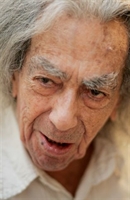
Just read
the headlines that Hungarian poet Gyorgy Faludy died at the age of 95. Faludy was an important translator of Villon, before he gained fame as a post-war dissident poet. His
latest interviews bemoaned the fall of "high" literature as a central force in Western culture.

While I might argue against some of Faludy's views about the standing of literature (mostly to deal with whether or not it ever held that centrality in popular culture), his passing is sadly, perhaps aptly, overshadowed by the news of the death of Steve "Crikey!" Irwin, the Australian "Crocodile Hunter," and his all too apt death by the barb of a stingray (the power of Karma). Yes, Irwin did couch his manic antics with all the proper environmental messages, but his very intrusion into nature was so bloody wrong--all about inquisition, intervention, and shouting, amid all his mostly staged encounters with the natural world.
 While I might argue against some of Faludy's views about the standing of literature (mostly to deal with whether or not it ever held that centrality in popular culture), his passing is sadly, perhaps aptly, overshadowed by the news of the death of Steve "Crikey!" Irwin, the Australian "Crocodile Hunter," and his all too apt death by the barb of a stingray (the power of Karma). Yes, Irwin did couch his manic antics with all the proper environmental messages, but his very intrusion into nature was so bloody wrong--all about inquisition, intervention, and shouting, amid all his mostly staged encounters with the natural world.
While I might argue against some of Faludy's views about the standing of literature (mostly to deal with whether or not it ever held that centrality in popular culture), his passing is sadly, perhaps aptly, overshadowed by the news of the death of Steve "Crikey!" Irwin, the Australian "Crocodile Hunter," and his all too apt death by the barb of a stingray (the power of Karma). Yes, Irwin did couch his manic antics with all the proper environmental messages, but his very intrusion into nature was so bloody wrong--all about inquisition, intervention, and shouting, amid all his mostly staged encounters with the natural world.
 While I might argue against some of Faludy's views about the standing of literature (mostly to deal with whether or not it ever held that centrality in popular culture), his passing is sadly, perhaps aptly, overshadowed by the news of the death of Steve "Crikey!" Irwin, the Australian "Crocodile Hunter," and his all too apt death by the barb of a stingray (the power of Karma). Yes, Irwin did couch his manic antics with all the proper environmental messages, but his very intrusion into nature was so bloody wrong--all about inquisition, intervention, and shouting, amid all his mostly staged encounters with the natural world.
While I might argue against some of Faludy's views about the standing of literature (mostly to deal with whether or not it ever held that centrality in popular culture), his passing is sadly, perhaps aptly, overshadowed by the news of the death of Steve "Crikey!" Irwin, the Australian "Crocodile Hunter," and his all too apt death by the barb of a stingray (the power of Karma). Yes, Irwin did couch his manic antics with all the proper environmental messages, but his very intrusion into nature was so bloody wrong--all about inquisition, intervention, and shouting, amid all his mostly staged encounters with the natural world.
Comments
He was larger than life, yes, but he was also a devoted husband and father, and if for no other reason than that, his death is a tragedy. I am also sorry to hear about Mr. Faludy's death, even though I am not a writer, and know little about him. With the exception of a few people, I would be inclined to be sorry for the deaths of most people.
As I said in my post, he exprsssed all the "right" things about conservation, but as you imply, he had to make a spectacle of an encounter with nature, to make it "interesting." That's my very problem with his work. I found that kind of interaction, where he stressed some animal so that it exhibits basic survival reactions, to be completely disrespectful and pornographic. Obviously his success says more about our culture than it does about his message.
In the for what it's worth category, nearly all nature shows rely on staging techniques, and many needlessly stress the wildlife. For instance, a "benign" example: any scene of animals running in the wild from a nice overhead tracking shot. On film, that shot is usually accompanied by music, something reverential perhaps, following a herd of caribou running across frozen tundra. No harm in that, surely. But in real life, those animals are fleeing a low-flying helicopter, desperate to run away, and expending critical energy that compromises their ability to survive.
I apologize if I cannot rationalize this interaction away as an "educational" enterprise. And I wonder if the quality of Irwin's message, such as it was, wasn't drowned out by its own noise.
About wildlife rescue, I prefer and financially support the quiet work of rehabilitation clincs, like CROW.
P.S. I admit I'm a callous snob. I rarely mourn the death of celebrities, principally because there's something grotesque, uncritical, imbalanced, and indulgent about it all. That's not to say the individual grief is misplaced, but that the significance we confer on those deaths reflects something of our own hollowness.